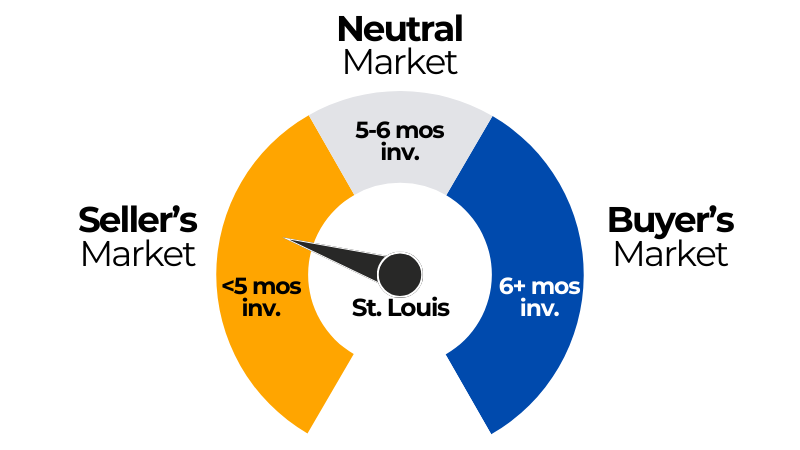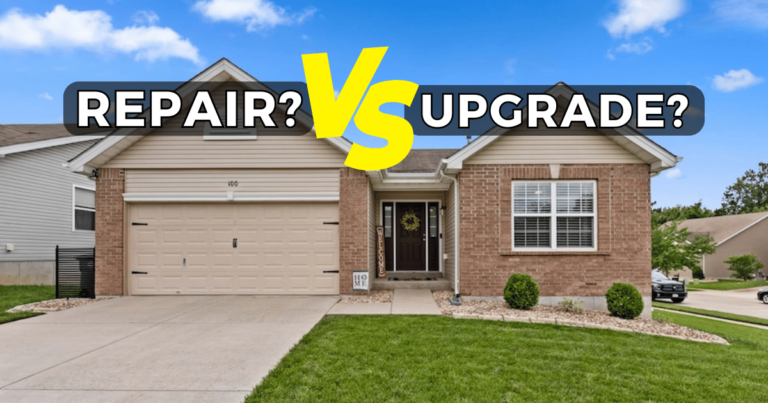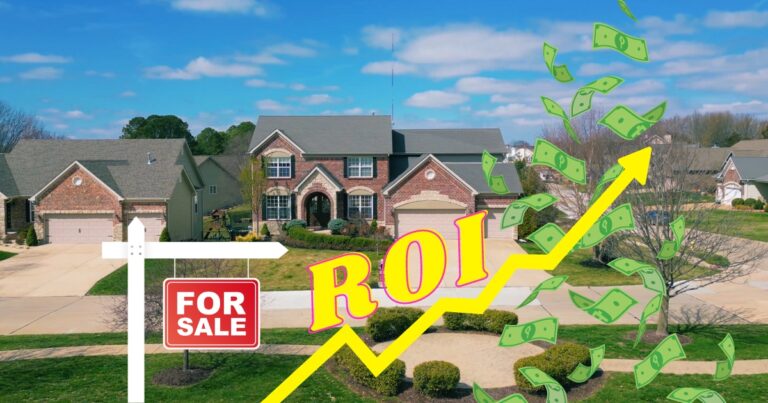The Guide to Selling Your Home in St. Louis, MO
Buying a home is often the biggest investment you’ll make in life. Selling a home is equally as big of a decision, and it often means you’ll be selling your current home while purchasing a new home. That is no small task!
Let’s look at what it takes to sell your St. Louis home, from getting it market-ready to closing the deal. Our goal is to make the process as stress-free as possible.
At Gateway Realty Group, we provide unparalleled assistance to clients looking to sell a home. Our experienced realtors are dedicated to making the selling process effortless, ensuring you maximize profits with ease.
Table of Contents
WHAT OUR CLIENTS SAY
Meet The Gateway Team
Award-Winning St. Louis Realtors
Gateway Realty Group is a full-service real estate team at Red Key Realty Leaders specializing in St. Louis county, St. Charles county and surrounding areas. Our agents take pride in offering clients comprehensive, professional-grade services and honest, expert-level advice. Whether you are looking to buy your next home or list a current property, Gateway Realty Group is here to help.
Hiring a Real Estate Agent in St. Louis, MO
Finding an experienced real estate agent who knows the area can save you a lot of headaches and get you top dollar for your house. They can advise you on the listing price, staging, and repairs you should make.
Realtors also typically handle scheduling, negotiations, paperwork, and marketing to name a few.
Realtors earn a commission on the sale of a house, typically 5% to 6% of the sale price. For example, if you’re selling a $200,000 home, that’s $10,000 to $12,000 of commission.
The commission is commonly split between listing and buyer’s agents; however, the seller is not obligated to pay for a buyer’s agent.
Luckily, the commission comes from your closing proceeds, so you don’t have to have cash in hand when you sign a listing agreement.
If you choose to sell on your own, you will need to handle all of the marketing, scheduling, negotiating, and closing details yourself.
Even without a listing agent, you may still want to pay the buyer’s agent’s commission. The buyer’s agent works to show your house and expose it to as many buyers as possible.
But the choice of paying a commission is ultimately yours.
Tip: Real Estate commissions are negotiable, so you may be able to negotiate a lower rate.
More Money in Your Pocket With Less Work
Homes listed by realtors typically sell for more money than homes that are owner-sold.
In 2023, here were the median sale prices between agent vs. owner-sold homes:
Agent-listed median sale price: $405,000
FSBO median sale price: $310,000
That’s a $95,000 difference!
Even if there’s a 6% commission, that’s an extra $89,300 that could go into your pocket.
A realtor takes a lot of the weight off your shoulders during the process of selling your home.
Here are some of the time-consuming tasks we do when helping clients sell:
- Advertise the home
- Help prepare a house for showings
- Show the home to buyers
- Hande buyer offers
- Make sure earnest money gets deposited
- Prepare contracts
- Negotiating offers
- Review loan paperwork
- Arrange title searches and communicate with escrow agents
- Home inspections
- Municipal inspections
- Buyer contingencies
- Coordinate appraisals
- Closing documents
- Final walkthrough
This assumes that things go perfectly to plan when selling a home, which isn’t always the case.
When clients hire us, we represent their best interests no matter what. Sometimes, having someone else help you with your home sale can make a world of difference in keeping your head up and staying positive throughout the process.
How do I Find a Realtor That’s Right for Me?
Lucky for us, we live in the Internet age, where looking up profiles, qualifications, and reviews is a few buttons away.
Here are a few considerations when evaluating potential realtors:
Take a look at their past listings.
- How professional do the listings look?
- Are the photos high-quality?
- How well are they marketed?
- What kind of description did the agent include for each listing?
How much experience does this agent have?
Asking about their experience is one of the best ways you can evaluate the realtor you’re considering hiring. You’ll want to understand your agent’s expertise… not just how long they’ve been in the business.
How many houses do they sell per year?
This may give you a better idea of how they perform instead of just asking how many years they’ve been in the business.
A realtor with 5 years of experience selling 50 homes a year could be much more effective than someone with 25 years of experience selling 2 homes a year.
What areas do they serve?
Familiarity with the area is one of the most important things to ask your realtor about.
Some agents only sell within one town or zip code, while others have deep experience selling in multiple areas. For example, at Gateway Realty Group, we primarily sell in St. Louis City, St. Louis County, and St. Charles County.
Does this realtor have any designations?
Realtors have the ability to take additional courses to earn specific qualifications on top of their real estate license. Designations can show the realtor’s dedication to specific skills within the real estate industry. Here’s a link to a list of designations and what they mean.
Once you’ve narrowed down your search, contact the realtors you’ve selected and ask them questions!
Read Our Article
39 Questions to Ask a Realtor When Selling Your Home
Should I Sell My House?
The first question may be an obvious one: Do you need to sell now?
Depending on the housing market, it may be worth selling as soon as possible. Other times, it’s best to wait if you can. However, if you’re relocating because of a new job or a life change, you may not have a choice.
The good news is that, according to a March 2024 housing report, St. Louis is in a seller’s market. This means houses tend to sell faster and for more money.

Determining Your Timeline
Just like the home-buying process, the selling process can be lengthy. Planning ahead and making key decisions early on can help you stay organized throughout the journey.
Consider the following:
- When do you plan on moving into your next home?
- How do you plan on selling your house? Are you using a realtor? Selling it “for sale by owner”? Selling as-is to real estate investors? (we’ll touch on this next)
Depending on how you sell and the contract process, selling your home could take 30 to 90 days. You’ll want to plan accordingly.
Selling With a Real Estate Agent vs. FSBO vs. As-Is
When selling your house, you decide whether to hire a realtor, sell the house yourself, or sell it as-is to a cash home buyer.
Your personal circumstances, skill set, availability, and patience will help direct which route to take.
Here’s an overview of the different selling options we see in St. Louis and some of their pros and cons.
I Have a Realtor. Now What?
Here’s how you’ll get started with the home sale process once you’ve hired a realtor.
Step 1: Schedule a tour of your home with your agent.
Step 2: Discuss any potential repairs, upgrades, or staging to be completed before listing your home.
Step 3: Establish an asking price based on the current market and comparable property sales.
Step 4: Prepare your home to be photographed and put on the market.
Step 5: List your home and begin showings.
Let’s say you decide not to go the route of hiring a realtor.
You may want to consider selling “for sale by owner.”
Selling For Sale By Owner (FSBO)
Some homeowners decide not to hire a realtor to save on the commission fee. According to a 2023 report by the National Association of Realtors, 7% of all sellers chose to sell FSBO.
Of those who sell FSBO, only 11% successfully sell, according to Clever’s 2024 report.
Selling a house yourself is time-consuming, and you won’t have access to the experience and knowledge a realtor can bring. If you decide to sell FSBO, make sure you do your research and know what you’re getting yourself into.
If you’re interested in selling your house yourself, let’s discuss what you should know:
If you have time, are very organized, and have marketing and negotiation skills, you might consider going “For Sale By Owner” or “FSBO.”
It might save you money on the seller’s commission fee, but it can be incredibly time-consuming.
You’ll also need to be able to handle potential buyers’ comments and possible criticisms about your home. You’ll need to be internet savvy, as most people nowadays start their search online. Make sure your home is listed on all the major search engines for maximum exposure.
The Biggest Challenges for FSBO Sellers:
- Getting the price right
- Understanding contracts and performing paperwork
- Having enough time to handle the sale
- Knowing what to fix up and what to leave as-is
- Communicating with buyers, lenders, escrow officers, and attorneys
- Lawsuits & legal issues
Helpful tip: Lack of disclosure is one of the most common causes of lawsuits in real estate transactions. Make sure you are disclosing the necessary information to all buyers.
We live in a litigious society. Lawsuits happen all the time. If you are selling your home without representation, be extremely cautious and make sure you understand the real estate contract.
Here are some of the most common reasons lawsuits are filed against FSBO sellers:
- Breach of contract
- Failure to disclose
- Fraud
- Misrepresentation
Things to Know Before Selling FSBO
If you do decide to sell your home yourself, here are some tips:
Prepare your house. Take a walk around and try to view it as a prospective buyer. Is there any wear and tear? How does it look from the outside? Does it have good curb appeal? How old are the appliances, water heater, and roof? Consider making repairs before selling your house. Buyers will pay top dollar for a home in top condition.
Depersonalize and declutter. If you have a lot of stuff, consider getting a storage unit temporarily. A crowded room can make it look small. This includes personal items and family photos.
Consider painting the walls. Aim for a neutral color and replace any old, ornate fixtures with more up-to-date choices.
Get a pre-sale home inspection. A pre-listing inspection will help you identify anything that needs to be repaired or that might show up on the prospective buyer’s inspection. Doing an inspection early will ensure there are no surprises later, once you’re under contract.
Curb appeal. Make sure the lawn and exterior of the house are presentable, it’s the first thing potential buyers will see when they arrive or do a drive-by!
Have your home professionally deep cleaned. Dirty walls or floors can give the impression that the property hasn’t been cared for, which is a turn-off for potential buyers.
Get professional photos. Invest in high-quality professional photos of your home. They are worth every penny, and there is a substantial difference between professional-level photos and pictures that were clearly taken on someone’s iPhone.
Determine a price. Compare your home to others in the area to determine your list price. If you really want to prepare, consider having your home professionally appraised by a licensed appraiser.
Market the home. You might want to consider using MLS, yard signs, flyers, social media, and FSBO website options. Get the word out!
Get organized. Be prepared to receive questions and showing requests from buyers and their agents. Plan an open house. Anticipate questions people may have about your home, neighborhood, and area.
Fill out disclosure forms. Many buyers will feel more at ease when they can review a seller’s disclosure statement where you disclose any material defects with your home.
Be prepared to negotiate the price. When a buyer or their agent sends you a contract, pay close attention to the response time. You might have 12 hours or as much as 2-3 days to respond to an offer.
Consider a real estate attorney. If you’re not working with a realtor, hire an attorney to help with all the nitty-gritty paperwork.
Know your costs: cleaning fees, photography fees, MLS listing fees, repair costs, attorney fees, home appraisal fees, and buyer’s agent fees. While you can get away with doing some of this yourself, paying a little bit, in the beginning, can bring you bigger returns later if you strategize correctly.
If you get into all this and realize it just isn’t for you, no worries! You can always hire a local real estate agent later.
Read Our Article
Things to Fix Before Selling Your House in St. Louis, MO
Selling to Investors and Cash Home Buyers
If you’re looking to sell your house fast in St. Louis and you’d rather have a quicker closing than listing on the market, you might want to consider selling as-is to a cash buyer.
Selling as-is means you will be selling the property in its current condition with no repairs or concessions.
You may have seen advertisements that say things like:
“We Buy Houses”
“Get Cash for Your Ugly House”
“Sell Your Home Fast”
“Sell My House Fast For Cash”
“We Pay Cash For Ugly Houses”
You’ll see this a lot in St. Louis. These investors like to buy houses that have been gutted, are in extreme disrepair, or have unfinished remodeling.
These properties are often targeted towards developers and real estate companies who will buy the house below market value, fix it up, and either sell it or market it as a rental property.
If your home is in rough condition and you’re looking for a fast sale with minimal effort, selling it as-is could be a good option.
Here are some reasons people decide to sell to St. Louis cash home buyers:
- They want to get rid of inherited property
- There’s fire damage
- It’s a vacant house
- You’re upside down on the mortgage
- Divorce
- Bad tenants
- Fire damage
- Code violations
- The home is not inhabitable
Selling a house as-is doesn’t always mean a quick sale with no waiting. You’ll still want to do your research and understand how the process works.
It can be difficult to sell to investors for a fair price. Typically they will lowball you with the hope that you’re desperate enough to sell fast for a reduced price. Don’t expect a fair offer at market value.
While a “no-hassle” sale may sound appealing to sign over your property and run to the bank, you’ll want to do some research on whether or not the company is reputable. It’s easy to be taken advantage of if you don’t fully understand the contract you’re signing with a cash buyer.
There are also typically no commissions paid in a cash as-is sale to an investor. If there is a wholesaler or real estate agent involved, sometimes the cash buyer will pay the agent commission for you.
But keep in mind, you will usually get significantly less on your home than if you opt for a traditional sale, anywhere from 10% to 60% below the market value!
Tips No Matter How You Choose to Sell Your Home
Pricing Strategy
In St. Louis, MO, the market value of your home is based on a combination of factors:
- The Current Market
- Comparable Listings
- Location
- Neighborhood
- Age of the Home
- Condition of the Home
- Improvements
Our pricing strategy plays a key role in the home selling process and can mean the difference between selling right away or sitting on the market for months.
Check the comparable properties (called “comps”) in surrounding areas. Home sellers are sometimes tempted to list higher and then discount it later. Don’t do that. You’ll add unnecessary time on the market, and buyers will often lowball you and try to negotiate when they think you’re over priced.
It’s better to under price and let buyers bid over-asking price on your home.
Read Our Article
How to Sell Your Home Over List Price in St. Louis, MO
Curb Appeal
The outside of your house is the first thing people will see. If they’re interested after seeing all the listings online, they’ll also do drive-bys. You’ll want to make sure the outside is well-maintained and inviting.
7 Easy Ways to Boost Your Curb Appeal
1. Fresh Coat of Paint on the Front Door
A freshly painted front door makes a great first impression of your home. Evaluate the condition of your home’s exterior paint, as well as the front steps, patio, and railings. A fresh coat of paint can make all the difference!
2. Add Flowers to the Front Porch
Sometimes, the simplest things can make the biggest difference. New planters on the front porch filled with beautiful, vibrant flowers will make your St. Louis house appear more inviting, warm, and welcoming.
3. Update Exterior Light Fixtures
Replace faded, builder-grade exterior lighting with new, up-to-date fixtures. Shiny new fixtures will brighten up your home at night and make it look clean and polished during the day. Also, evaluate the front door handle and lockset.
4. Pressure Wash the Driveway/Exterior
While a dirty, oil-stained driveway gives the impression of a home that may need some work, a pressure-washed driveway and walkway present a clean, well-maintained home.
5. Keep the Lawn & Garden Tidy
A freshly cut lawn and well-manicured gardens show a well-cared-for home. Keep up with lawn mowing to be ready for showings.
6. Add or Replace House Numbers
Clear, crisp numbers that can be seen from the street make your home easier to find and give it a boost in overall appearance. You may also want to evaluate the condition of your mailbox.
7. Add a Welcome Mat
Add a brand new welcome mat to greet buyers as they walk through the front door. Even the smallest details like these can make a home feel more inviting.
Getting Ready: Photo Prep Checklist
Having your home photographed is an important first step in getting ready to sell. Photos make the first impression on buyers, and great pictures can help them envision your home as their own. These days most people shop online first, so getting your house photo ready is an important step in selling your home.
- Follow the tips for improving your home’s curb appeal
- If you’re not hiring a professional stager, make sure you declutter by removing any unnecessary furniture.
- Remove anything bold or highly stylized
Paint the walls neutral colors - Take down any family photos or bold art
- Make sure everything is clean
Have photos taken on a sunny day. If it’s a rainy day, you risk your home looking dreary. Brightening things up can be done in editing, but the lighting and overall feel of the pictures will be better if it’s a nice day out.
You’ll want your home to look like it’s being photographed for a home magazine. Bright, airy, neutral, and free of clutter.
You’re On the Market… Now Offers and Negotiations
Accepting the highest price offer seems like a logical choice, but there are many factors to consider when reviewing an offer, and knowing your options lets you come up with a plan that works best for you.
Cash Offer
Some sellers accept a lower-priced cash offer over a higher-priced loan offer because fewer issues arise, such as a loan falling through. Consider your timeline and finances to evaluate if it is worth accepting a lower offer for a faster closing and often a much simpler process.
Closing Date
Some buyers may want to move in as soon as possible, while others may need more time to sell their house. You may be able to select an offer based on the timeframe that works best for you, or you might have to be more flexible to close the deal.
Closing Costs
Closing costs are on the buyer’s list of expenses, but buyers may ask the seller to pay for some, or all of them, as part of the sale.
Contingency Clauses
A contingency clause is a qualifying factor that must be met for the buyer to move forward with the sale. Contingency clauses often include details of financing, inspections, and contingent home sales. Contingencies can be negotiated between you and the buyer. The contingency allows the buyer to back out of the contract without penalty if the terms are unmet. Generally speaking, the fewer contingencies in a contract, the fewer opportunities a buyer has to walk away from the deal.
From Contract to Close
Once you and the buyer have agreed on terms, the residential sale contract is signed. Congratulations, your home is officially under contract.
Inspection
Property inspections ensure the home is in the condition it appears to be. In St. Louis, the typical inspection timeframe is 10 days, beginning the day after the contract is accepted. However, this timeframe is negotiable, so it may not always be 10 days. If the inspector finds any issues, the buyer can decide whether to back out of the contract or renegotiate the terms of the sale.
Repair Negotiation
After an inspection, buyers may have to make repairs they would like completed before purchasing your home. During this period, most terms of the contract are up for negotiation. Both parties must come to an agreement on what will be repaired and what will not. You have the flexibility to decide whether there will be a price deduction to accommodate the repairs.
Appraisal
If the buyer is applying for a loan, the bank will request an appraisal to confirm that the home is worth the loan amount. The appraisal considers comparable property sales, as well as the home’s age, location, size, and condition, to determine the property’s current value.
Final Walkthrough
Before a buyer signs the closing paperwork, they will come to the home for a final walkthrough. This last step is to verify that no damage has been done to the property since the inspection, that any agreed-upon repairs have been completed, and that nothing from the purchase agreement has been removed from the home.
The Final Step: Clear to Close
Closing is the final step in the selling process. On closing day, both parties sign documents, funds are dispersed, and property ownership is formally transferred to the buyer.
Closing expenses for sellers can include:
- Title insurance policy
- Home warranty
- Realtor commissions
- Recording Fees
- Property Taxes (split with the buyer)
- The remaining balance on your mortgage
- Any unpaid assessments, penalties, or claims against your property
- Etc.
Items to Bring to Closing:
- Government Issued
- Photo ID
- House Keys
- Garage Openers
- Mailbox Keys
Whether you’re selling a house in St. Charles County, Richmond Heights, Maryland Heights, Webster Groves, Creve Coeur, St. Louis County, or the city, following these tips and guidelines can help you succeed in selling your Saint Louis home!
Selling Your House in St. Louis, MO
At Gateway Realty Group, we provide next-level assistance to our clients looking to sell their homes in the Greater St. Louis Area. Our experienced agents are dedicated to making the selling process as smooth as possible. We want to help you maximize your profits, sell quickly, and transition with ease.















